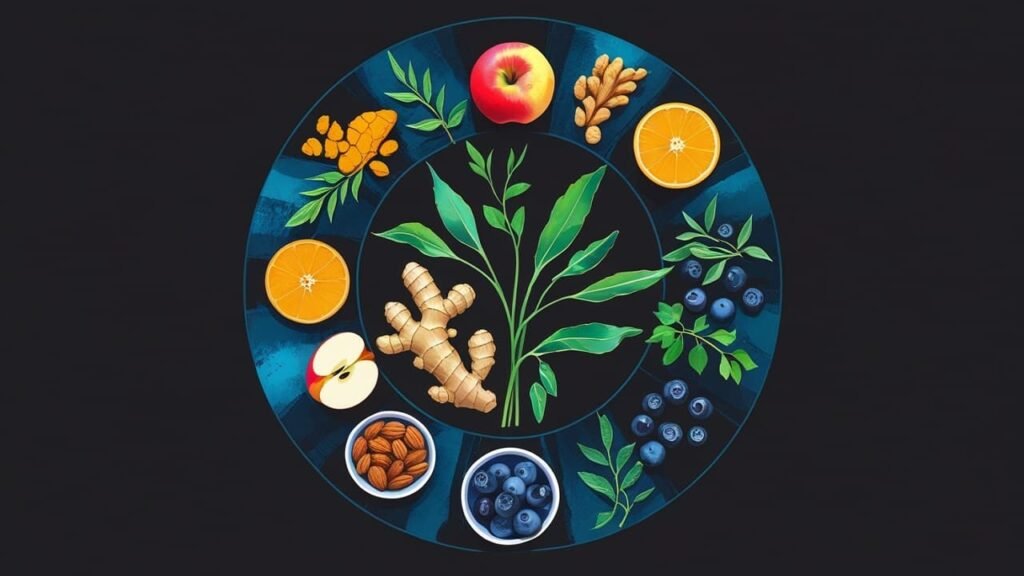Inflammation becomes a common concern as a contributor to arthritis, heart disease, diabetes, and cognitive decline. While some level of inflammation is natural, chronic inflammation wreak havoc on the body.
Fortunately, seniors can take proactive steps to combat inflammation through their diet by incorporating anti-inflammatory foodsinto their daily meals. These nutrient-rich foods not only help reduce inflammation but also support overall health, vitality, and longevity.
Why Is Inflammation a Concern for Seniors?
Inflammation is the body’s natural response to injury or infection. It serves as a protective mechanism to heal damaged tissues and fight off harmful pathogens. However, chronic inflammation or low-grade systemic inflammation silently damage tissues and organs over time.
Aging brings changes in immune function. The immune system becomes less efficient at regulating inflammatory responses. When the body can’t handle inflammation properly, it leads to overproduction of pro-inflammatory molecules like cytokines. This phenomenon is linked to an increased risk of chronic conditions such as arthritis, heart disease, diabetes, and Alzheimer’s disease.
Chronic inflammation also takes a toll on emotional well-being. It leads to fatigue, reduced mobility, cognitive decline, and a diminished quality of life. For seniors, unchecked inflammation accelerates the loss of independence and vitality.
This makes it especially important for seniors to focus on anti-inflammatory eating habits and lifestyle choices to maintain mobility, and mental clarity. By incorporating nutrient-rich foods, seniors can better manage inflammation.
The Power of Anti-Inflammatory Foods
Certain foods are packed with antioxidants, healthy fats, vitamins, and minerals that help neutralize free radicals and reduce inflammation. Below are some of the best anti-inflammatory foods for seniors.
Fatty Fish
Fatty fish offers an abundance of omega-3 fatty acids—specifically EPA (eicosapentaenoic acid) and DHA (docosahexaenoic acid). These essential fats play a crucial role in reducing inflammation by balancing pro-inflammatory molecules in the body.
Omega-3s also support heart health by lowering triglyceride levels, reducing blood pressure, and preventing plaque buildup in arteries. They promote brain health by improving cognitive function. Fatty fish protects against neurodegenerative diseases, supports mental well-being and combats symptoms of depression and anxiety.
For seniors, incorporating fatty fish into the diet is particularly beneficial because it helps combat age-related inflammation, supports joint mobility, and enhances overall vitality. Moreover, omega-3s contribute to healthier skin, stronger bones, and improved eye health.
Fatty fish example: salmon, mackerel, sardines, and tuna.
Leafy Greens
Dark leafy greens comes with vitamin C , vitamin K , and beta-carotene. These greens play a vital role in combating oxidative stress and reducing chronic inflammation.
Oxidative stress occurs when there’s an imbalance between free radicals and the body’s ability to neutralize them. The antioxidants in leafy greens help neutralize these free radicals. Their high fiber content supports gut health.
For seniors, incorporating more leafy greens into the diet improves bone health, boost immunity, and support eye health.
Leafy Greens example: spinach, kale, collard greens, and Swiss chard.
Berries
Berries are rich in flavonoids and polyphenols. Flavonoids and polyphenols are powerful plant compounds that have been shown to reduce inflammation and protect cells from oxidative damage. These antioxidants help neutralize free radicals, which can otherwise lead to chronic inflammation.
Berries are also low in sugar compared to many other fruits. So, seniors can manage blood sugar levels while still enjoying something sweet. Berries are packed with fiber, which supports gut health and helps regulate digestion—another key factor in reducing systemic inflammation.
Berries example: blueberries, strawberries, raspberries, and blackberries.
Nuts and Seeds
Nuts offer a wealth of benefits for seniors. They are packed with healthy fats, fiber, and antioxidants. These small foods play a crucial role in reducing inflammation and supporting cardiovascular health. The healthy fats found in nuts and seeds—particularly omega-3 fatty acids (in walnuts and flaxseeds) and monounsaturated fats (in almonds)—help lower LDL (“bad”) cholesterol.
Their fiber content supports digestive health and stabilizes blood sugar levels. Antioxidants like vitamin E and polyphenols combat oxidative stress.
Nuts and seeds example: almonds, walnuts, flaxseeds, chia seeds, and sunflower seeds.
Extra Virgin Olive Oil
Mediterranean diet is one of the most well-researched diets for its anti-inflammatory and longevity-promoting benefits. Extra virgin olive oil (EVOO) is considered a cornerstone of the Mediterranean diet.
What sets EVOO apart is its high concentration of monounsaturated fats and polyphenols, particularly a compound called oleocanthal.
Oleocanthal has been shown to have potent anti-inflammatory properties, acting similarly to ibuprofen by inhibiting inflammatory pathways in the body. This makes EVOO an excellent choice for seniors looking to reduce chronic inflammation.
In addition to its anti-inflammatory benefits, extra virgin olive oil is rich in antioxidants, which help combat oxidative stress and protect cells from damage. It also supports healthy cholesterol levels by increasing HDL (“good”) cholesterol.
Turmeric and Ginger
Turmeric and ginger are two of the most powerful anti-inflammatory spices. They are celebrated for their healing properties and culinary versatility.
Turmeric, particularly its active compound curcumin, has been extensively studied for its ability to reduce inflammation. Curcumin works by inhibiting inflammatory pathways in the body. It is especially beneficial for seniors dealing with arthritis, and chronic inflammation.
Similarly, ginger contains potent bioactive compounds called gingerols and shogaols, which have strong anti-inflammatory and antioxidant effects. Ginger is also known to soothe digestive issues, reduce nausea, and improve circulation. It is a valuable addition to any senior’s diet.
Together, these spices help manage inflammation, boost immunity, and promote vitality.
Whole Grains
Whole grains are essential components for seniors. Unlike refined grains, which have been stripped of their nutrient-rich bran and germ, whole grains retain all parts of the grain kernel. It provides a wealth of fiber, vitamins, minerals, and antioxidants.
The high fiber content in whole grains plays a critical role in promoting digestive health, and reducing inflammation. For seniors, incorporating whole grains into meals help manage conditions like type 2 diabetes, and obesity.
The anti-inflammatory benefits of whole grains come from their ability to stabilize blood sugar spikes, reduce insulin resistance, and feed beneficial gut bacteria. A healthy gut microbiome is closely linked to lower levels of systemic inflammation.
Additionally, whole grains are rich in magnesium, selenium, and B vitamins, which further support immune function, bone health, and cognitive performance.
Whole grains example: oats, quinoa, brown rice, and whole wheat.
Green Tea
Green tea is more than just a calming drink for seniors. Rich in catechins, green tea has been shown to combat inflammation.
One of the most notable catechins in green tea is epigallocatechin gallate (EGCG). This reduces risks of Alzheimer’s and Parkinson’s. For seniors, drinking green tea regularly improve cognitive function, enhance mood, and promote longevity.
In addition to its anti-inflammatory properties, green tea supports metabolic health by aiding in weight management and improving insulin sensitivity. It also promotes oral health by reducing harmful bacteria and supporting gum health.
With its soothing flavor and versatility, green tea is an easy and enjoyable way to incorporate more antioxidants into the daily routine of senior citizens.
Tomatoes
Tomatoes are a vibrant and versatile superfood. They are celebrated for their rich content of lycopene. Lycopene plays a key role in reducing inflammation. Lycopene has been extensively studied for its ability to protect cells from oxidative damage.
For seniors, tomatoes are particularly beneficial because lycopene supports cardiovascular health by improving cholesterol levels. Additionally, tomatoes packed with vitamin C, potassium, and folate, further contribute to immune function, and muscle strength.
One unique aspect of lycopene is that its bioavailability increases when tomatoes are cooked. For seniors looking to combat inflammation and support long-term health, incorporating tomatoes into meals is a impactful dietary choice.
Dark Chocolate
Dark chocolate is more than just a decadent treat. It’s a nutrient-dense food with impressive health benefits. Dark chocolates are rich in flavanols. Flavanols reduce inflammation is seniors. They help relax blood vessels, lower blood pressure, and enhance overall cardiovascular function.
Dark chocolate contains antioxidants like polyphenols and catechins. They combat oxidative stress and protect cells from damage.
For seniors, enjoying dark chocolate in moderation can boost mood and cognitive function, thanks to its ability to stimulate the production of endorphins and serotonin.
While dark chocolate offers numerous health benefits, it’s important to choose high-quality options with minimal sugar. Avoid overindulging. Pair dark chocolate with other nutrient-rich foods like fruits or nuts. This can create a balanced treat to supports physical and mental well-being.
For seniors, adopting an anti-inflammatory diet is one of the most effective ways to promote long-term health. By filling your plate with nutrient-dense, anti-inflammatory foods, you can reduce your risk of inflammation. Remember, small dietary changes can make a big difference. Start by incorporating just one or two of these foods into your routine and build from there. Your body will thank you!




